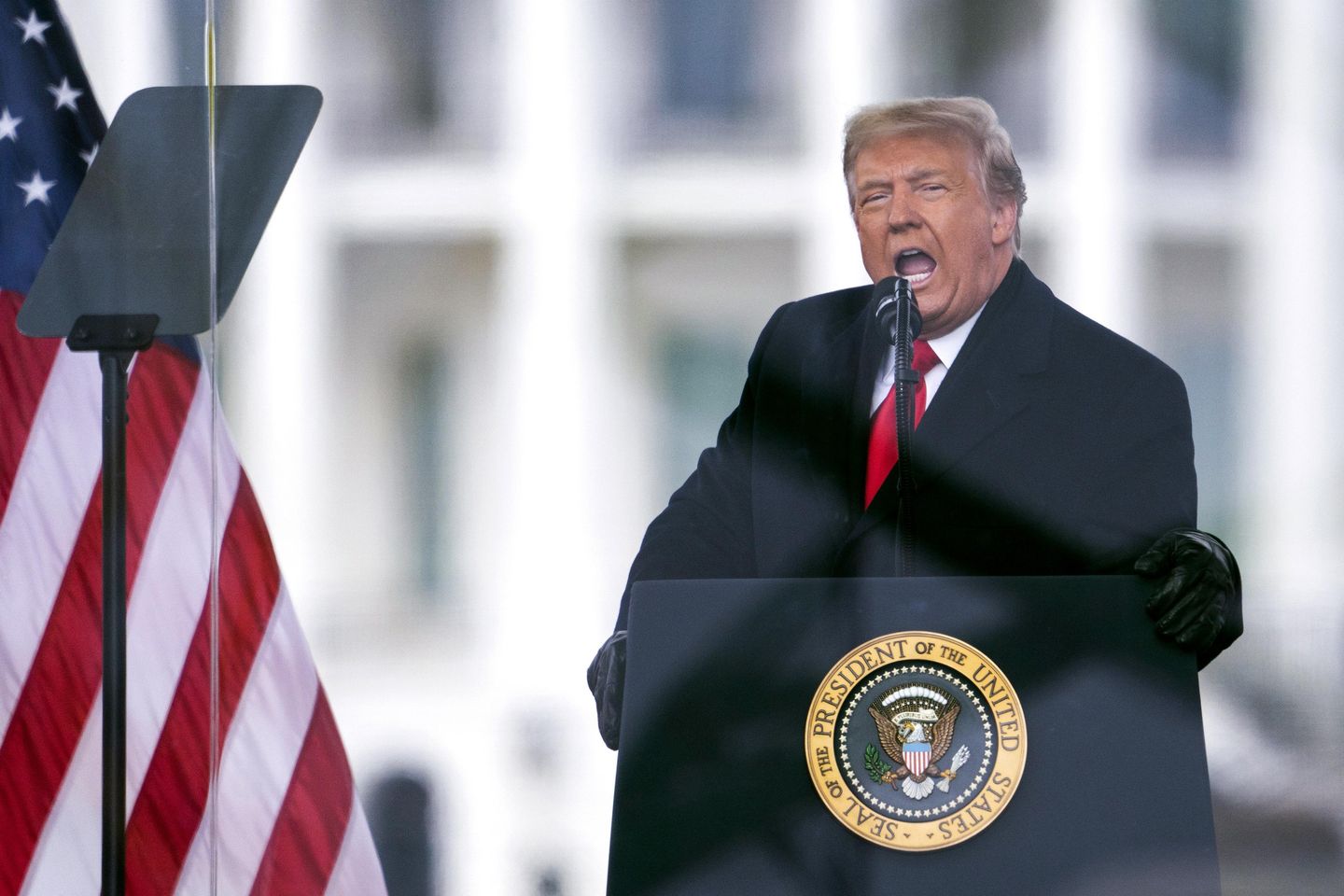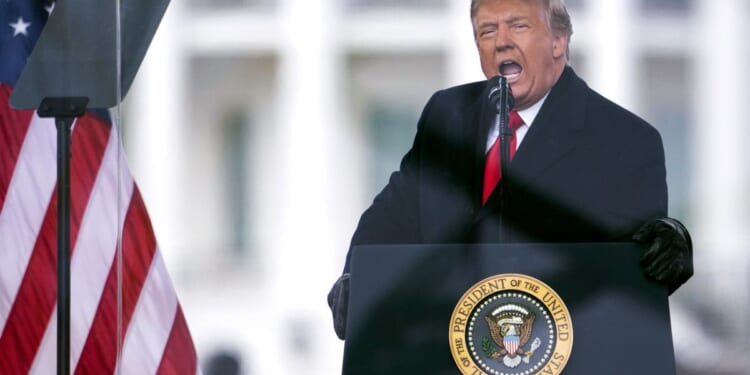
America is about to get an intense history lesson, courtesy of former President Donald Trump and those trying to keep him off the ballot this year under the Constitution’s 14th Amendment.
Written in the wake of the Civil War, the amendment bars from federal office a onetime U.S. official who engaged in insurrection or rebellion or gave aid or comfort to an enemy.
Now the high court must decide if that provision, last used more than a century ago by Congress to unseat a socialist congressman accused of supporting Germany in World War I, can be harnessed to shut down Mr. Trump’s hopes of winning a second term.
The NAACP Legal Defense and Educational Fund told the justices that the insurrection clause applies directly to Mr. Trump and the events of Jan. 6, 2021, pointing out that some in the mob that stormed the Capitol and temporarily disrupted the Electoral College count, egged on by Mr. Trump’s claims of a stolen election, carried Confederate flags.
“President Trump’s false claims of voter fraud were targeted at cities with large numbers of Black voters and other voters of color, thereby suggesting that they should not have a full and equal voice in determining the fate of our democracy,” the NAACP told the court.
Section 3 of the 14th Amendment reads: “No person shall be a Senator or Representative in Congress, or elector of President and Vice-President, or hold any office, civil or military, under the United States, or under any State, who, having previously taken an oath, as a member of Congress, or as an officer of the United States, or as a member of any State legislature, or as an executive or judicial officer of any State, to support the Constitution of the United States, shall have engaged in insurrection or rebellion against the same, or given aid or comfort to the enemies thereof.”
SEE ALSO: Federal court rules Trump is not immune from prosecution for election subversion
A group of historians — who support the Colorado voters hoping to bar Mr. Trump’s name from the primary ballot — says Section 3 of the 14th Amendment, which was ratified after the Civil War to ban confederates from holding office, applies to future insurrectionists, including prohibiting them from becoming president.
“Insurrectionists could take over state legislatures, state houses, Congress, the cabinet, and even the White House. Section Three was meant to prevent that possibility,” they wrote. “It remains in place and in force today.”
But Kansas Attorney General Kris W. Kobach, in his own filing with the justices, said lawyers in the 1860s would have known that the phrase “insurrection or rebellion” meant the Civil War or some similar expansive armed conflict, and it didn’t mean an isolated protest or riot.
The proof, he said, is that other laws written during the war and subsequent Reconstruction period used the same phrase.
“Thus, in the mind of Section 3’s drafters and ratifiers, there would have been no doubt that Section 3 was to apply only in those instances that amounted to something comparable to the Civil War,” Mr. Kobach argued.
One major question for the justices is whether Section 3 was meant to cover the presidency.
SEE ALSO: Trump to appeal immunity ruling to ‘safeguard the presidency,’ campaign says
Mr. Kobach pointed out that the actual language doesn’t read that way, and he said that can’t be a mistake. Those who wrote it were quite aware of the presidency and even included the word in an earlier draft, but deleted it in the final version.
The fact that the enacted version of Section 3 contains a list of positions throughout the federal, state, civil, and military ranks, but does not include the position of President should sound the death knell to Trump’s opponents’ competing interpretation,” he argued.
Not so, said Jeremi Suri, a historian and professor at the University of Texas.
“Any historian would tell you that the office of the presidency was in the intent,” he said of Section 3. “I am not a lawyer … but the history is very clear that the drafters of the amendment expected it would apply to presidents as well as governors.”
He said Section 3 grew out of the Civil Rights Act of 1866 and was meant to protect the new union from Confederates taking charge. One aspect was that there was a move to prevent Jefferson Davis, who served as the president of the Confederate States, from running for president of the Union.
He also disagreed with Mr. Kobach’s assessment that those who wrote the language wanted more than the events of Jan. 6 to trigger the bar.
“The drafters and those who lived through the Civil War — the Republicans of 1866, 1867 — would have seen January 6 as an insurrection,” Mr. Suri said. “They were very explicit that there should be no public interruption of the process of presidential certification and they prohibited Confederate flags from ever being brought into the Capitol.”
Some legal analysts said the law generally leaves it up to the president to determine whether an insurrection exists, though Congress can also play a role.
Mr. Trump has not been charged with, nor convicted of, insurrection.
A group of Harvard and Yale professors filed a brief with the justices arguing that the insurrection clause was Congress‘s response to President Andrew Johnson, who was taking a lenient approach to the Confederate leaders and to southern states’ readmission to the union.
However, the scholars said what Congress wrote applies beyond the Civil War.
“It remains in place and in force today,” they said.
The NAACP, in its filing, told the justices they carry a special burden to erase the Supreme Court’s troubled history with race and rulings such as Plessy v. Ferguson, the 1896 case that established “separate but equal” and gave legal cover to segregation.
“In case after case, it disregarded the text and design of the Reconstruction Amendments, allowing our system of government to become a mockery of the multi-racial democracy promised by the Reconstruction Congress,” the NAACP said. “This Court now has the chance to learn from that history, and to ensure that our nation does not replicate the grave mistakes of the late 19th and early 20th centuries.”
Mike Davis, president of the Article III Project that advocates for constitutionalist judges, said that the Jan. 6 was a lawful protest that devolved into a riot, whereas the Civil War almost divided the Republic.
“Fortunately, most Supreme Court justices don’t take the NAACP seriously,” he said.












